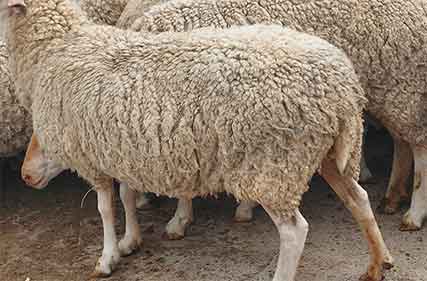
Parkdale SRS® Short-Tail ewes showing an elevated tail, keeping the tail and breech clean. Their wool can capture non-mulesed premiums in the market.
Blowfly resistant Short-Tail Merino sheep with high fertility and medium micron wool are proving to be game changers for western and peri urban growers, addressing animal welfare issues and reducing input costs.
The Short-Tail Merinos as a breed have been finetuned over 20 years by central western NSW grower Don Mudford, initially in conjunction with the late Dr Jim Watts, research scientist and founder of the Soft Rolling Skins (SRS®) principles.
Mr Mudford and his wife Pam run their Short-Tail Merino flock of 1000 breeding ewes as a nucleus flock on their Parkdale SRS® stud at Dubbo.
With the wool and skins classed on SRS® principles, the adult ewes average 20 micron and wean an average of 165 per cent lambs which require no tail docking or mulesing.
Skins are loose and pliable with a long, white and soft staple. The wool is able to capture any non-mulesed premiums in the market while the higher fecundity also equates to increased income per ewe and flystrike resistance means reduced chemical and labour costs.
Data has been collected over two decades on the age of the sheep and their tail length.
“Tail length is the highest heritable trait in a sheep at about 75 per cent,” Mr Mudford said.
“We started crossing western NSW Merino ewes with some short tailed, polled Finn sires with low density but white wool. The Finn breed has a lot of fat around their organs and that helps build in their hardiness, fertility and mothering ability.
“We kept crossing a wool sheep over the first cross ewe and we have now stabilised it at 3 per cent Finn (genetics), keeping the focus on tail length and wool quality.
“This has pushed our Short-Tail weaning rates to 170-180 per cent.”
When it comes to tail length, the tail reaches the top of the hocks or shorter in adult sheep.
“When all lambs are born, the muscle in the butt of the tail allows them to lift their tail. When they get older and the wool gets longer on that traditional long tail, the muscle becomes weak, so the tail gets wet in winter. In a short tail sheep, even half-length or shorter, the lambs maintain using that muscle and keep the tail out of the urine and faeces stream,” Mr Mudford said.
“They are no dirtier than mulesed wrinkly sheep.”
Originally, the family had introduced Finn genetics to commercial ewes in 2003 to increase fertility and transition to a polled flock. They found the crossbreds had shorter tails, so they established an experimental flock.
They discovered in one cross, the lambs did not have to be mulesed, the tails were shorter, lighter and thinner, and the breech was bare.
The family had been selling Short-Tail ewes privately, but the first public offering was in 2021 when growers paid to $230 for 5–7-year-old scanned empty ewes.
Their tails were a quarter to half the length of traditional Merinos, and they cut 5-6kg of 20 micron AAAM wool for 12 months growth. They had bare legs, some bare bellies and faces, and were consistently achieving pregnancy scans of 200 per cent and rearing 175 per cent plus lambs per ewe joined.
Western NSW wool growers appreciated the Parkdale Short-Tail sheep in areas where large paddocks, timber and scrub made it difficult to achieve a clean muster.
“If a lamb is missed at lamb marking, they do not have a long woolly, daggy tail. Interest also came from growers bordering urban areas where animal welfare issues such as mulesing were a focus,” Mr Mudford said.
“There is no blowfly preventative treatment required. We have left the tails on about 10 per cent of the sheep at lamb marking and if push came to shove, we wouldn’t have to tail dock any sheep.
“Genetically, the flock is stable at the moment with lines of short tail wool and frame ewes. We are at the point where we could go back to a pure Finn and halve the tail size again.
“Our long-term goal at Parkdale is to have more Short-Tail wool sheep in the flock and keep the quality of those sheep progressing with the tail length remaining shorter than the hocks.”
A draft of 200 scanned empty Short-Tail ewes are now offered in Parkdale’s annual on-property sale each year.
The Parkdale sale is one of the biggest single bloodline commercial ewe on-property fixtures in NSW and will feature 3700 mixed age Merino ewes, December shorn, on-property and interfaced with AuctionsPlus on February 20. The sale includes 100 Parkdale SRS® ewes.
